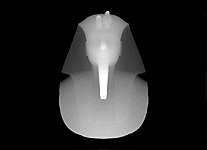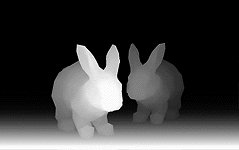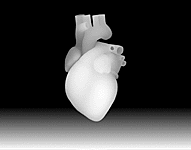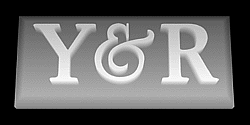Custom Stereograms

 “STEREOGRAM”
is a generic term for a seemingly random two-dimensional image that,
when properly viewed transforms itself into an astonishing three-dimensional
image. Roots of this art form date back to 1838, but today's computer
technology and creative minds have taken it to new heights. Today
stereograms have been widely accepted as a revolutionary communication,
marketing, and promotional tool and are available in a wide variety
of formats, from postcards... to posters. New Vision Technology
is pleased to offer you this state-of-the-art medium. “STEREOGRAM”
is a generic term for a seemingly random two-dimensional image that,
when properly viewed transforms itself into an astonishing three-dimensional
image. Roots of this art form date back to 1838, but today's computer
technology and creative minds have taken it to new heights. Today
stereograms have been widely accepted as a revolutionary communication,
marketing, and promotional tool and are available in a wide variety
of formats, from postcards... to posters. New Vision Technology
is pleased to offer you this state-of-the-art medium.
The Hidden Image
 This is the three-dimensional image you will see when the stereogram
is properly viewed (parallel viewing). It is best to provide us
with a rough sketch of what you envision this to be. It's very important
to keep in mind that stereograms are fairly vague in detail, therefore
keep your hidden image as simple, bold and large as possible. The
hidden image is nothing more than a “3-D silhouette” of
the object or scene you want to depict. If the object or scene cannot
be easily recognized as a 2-D silhouette... chances are that it
will not be easily recognized by most people as a stereogram. This is the three-dimensional image you will see when the stereogram
is properly viewed (parallel viewing). It is best to provide us
with a rough sketch of what you envision this to be. It's very important
to keep in mind that stereograms are fairly vague in detail, therefore
keep your hidden image as simple, bold and large as possible. The
hidden image is nothing more than a “3-D silhouette” of
the object or scene you want to depict. If the object or scene cannot
be easily recognized as a 2-D silhouette... chances are that it
will not be easily recognized by most people as a stereogram.
The Pattern
 The complexity of the hidden image will actually determine
the best type of pattern to be used. In most cases a graphical "swirly
or dotty" type pattern works best. We will design and produce
the appropriate pattern required and will submit color laser proofs
for your approval and/or selection. Many times clients prefer that
we use a recognizable pattern such as their logo, company name,
or small images of product, icons, etc. All of this is possible
in full 24 bit, 16 million color resolution. Should you have a specific
pattern in mind we would need to receive an example of the pattern
or art work for estimating purposes and also require the same examples
as an electronic file, print or transparency for production purposes. The complexity of the hidden image will actually determine
the best type of pattern to be used. In most cases a graphical "swirly
or dotty" type pattern works best. We will design and produce
the appropriate pattern required and will submit color laser proofs
for your approval and/or selection. Many times clients prefer that
we use a recognizable pattern such as their logo, company name,
or small images of product, icons, etc. All of this is possible
in full 24 bit, 16 million color resolution. Should you have a specific
pattern in mind we would need to receive an example of the pattern
or art work for estimating purposes and also require the same examples
as an electronic file, print or transparency for production purposes.
Logos, Text & Type
 These are perhaps the most popular, and yet the most difficult
items to portray as a hidden image within a stereogram. Although
we have had success with these items it is very important to minimize
the number of letters involved, and make the objects as large and
bold as possible. A good example of this is the “Y&R Stereogram”
shown in the Stereogram Gallery. Another
option in lieu of showing your logo as a hidden image is to add
it to the stereogram as a wallpaper object. These are perhaps the most popular, and yet the most difficult
items to portray as a hidden image within a stereogram. Although
we have had success with these items it is very important to minimize
the number of letters involved, and make the objects as large and
bold as possible. A good example of this is the “Y&R Stereogram”
shown in the Stereogram Gallery. Another
option in lieu of showing your logo as a hidden image is to add
it to the stereogram as a wallpaper object.
Repeating Wallpaper Objects
 To add “another dimension” to a stereogram it is
possible to overlay a variety of clip art images on top of the finished
stereogram. Depending upon the placement and spacing of these images
additional levels of depth can be produced. This is a very effective
way of adding art, logos, text and type to the image that will not
be distorted had it been incorporated into the pattern. Another
benefit is that the viewer can clearly see and identify these objects
without actually fusing the image. A good example of this is in
the Heart.jpg image shown in the Stereogram Gallery. To add “another dimension” to a stereogram it is
possible to overlay a variety of clip art images on top of the finished
stereogram. Depending upon the placement and spacing of these images
additional levels of depth can be produced. This is a very effective
way of adding art, logos, text and type to the image that will not
be distorted had it been incorporated into the pattern. Another
benefit is that the viewer can clearly see and identify these objects
without actually fusing the image. A good example of this is in
the Heart.jpg image shown in the Stereogram Gallery.
Image Size
 We have produced stereograms from the size of stamps... to
posters. The size of the stereogram is very important in determining
how it is to be produced and plays a major role in determining the
production costs. Most images are rendered at 250 to 300 dpi and
are designed to be printed at a specific size. Reducing or enlarging
the finished stereogram will effect its ease of viewability. All
stereograms produced by us should not be enlarged or reduced more
than 10%. We have produced stereograms from the size of stamps... to
posters. The size of the stereogram is very important in determining
how it is to be produced and plays a major role in determining the
production costs. Most images are rendered at 250 to 300 dpi and
are designed to be printed at a specific size. Reducing or enlarging
the finished stereogram will effect its ease of viewability. All
stereograms produced by us should not be enlarged or reduced more
than 10%.
Output
 In most cases we will provide you with a 4"x5" positive
transparency. Occasionally we have clients that prefer an electronic
file. Please specify type of file, computer platform, and removable
media type required. Color laser jet prints are also provided with
each order. In most cases we will provide you with a 4"x5" positive
transparency. Occasionally we have clients that prefer an electronic
file. Please specify type of file, computer platform, and removable
media type required. Color laser jet prints are also provided with
each order.
Turn-Around
 In most cases NVT can produce your custom stereogram and provide
you will the required output within two weeks of receiving the required
materials, required approvals and 50% deposit. Rush service is also
available at an additional cost. In most cases NVT can produce your custom stereogram and provide
you will the required output within two weeks of receiving the required
materials, required approvals and 50% deposit. Rush service is also
available at an additional cost.
Stereogram Gallery

 New Vision
Technology has developed their own proprietary software for producing
stereograms. This allows us to continually evolve and develop new
techniques and processes. You'll see from the examples below that
we are on the cutting edge of this technology, and are considered
to be a leading producer of this exciting form of visual communication. New Vision
Technology has developed their own proprietary software for producing
stereograms. This allows us to continually evolve and develop new
techniques and processes. You'll see from the examples below that
we are on the cutting edge of this technology, and are considered
to be a leading producer of this exciting form of visual communication.

Tut.gif - 270,459
bytes - 800 x 480 pixels
 The hidden image of King Tut is mapped with a pattern
of hieroglyphics. This is a good example of pattern construction,
mapping and placement. I'm sure you'll be quite surprised to see
his facial features magically appear The hidden image of King Tut is mapped with a pattern
of hieroglyphics. This is a good example of pattern construction,
mapping and placement. I'm sure you'll be quite surprised to see
his facial features magically appear

Bunny.gif - 255,503
bytes - 800 x 575 pixels
 Although produced "just for fun", this
image serves as a good example of using a "natural" type
pattern. Originally a photograph of a ground cover, the pattern
image was manipulated to serve as a "seamless" pattern.
Note how the placement of the little red flowers resemble the eyes
of the bunnies. Although produced "just for fun", this
image serves as a good example of using a "natural" type
pattern. Originally a photograph of a ground cover, the pattern
image was manipulated to serve as a "seamless" pattern.
Note how the placement of the little red flowers resemble the eyes
of the bunnies.

Heart.jpg - 156,422
bytes - 667 x 500 pixels
 Produced for a major medical company, the hidden
human heart image serves as a primary symbol, while additional wallpaper
objects (not shown in the grayscale) support the "Corporate
Image" depicted on other pieces of literature, catalogs and
brochures representing the company. Produced for a major medical company, the hidden
human heart image serves as a primary symbol, while additional wallpaper
objects (not shown in the grayscale) support the "Corporate
Image" depicted on other pieces of literature, catalogs and
brochures representing the company.

YR.gif - 241,502 bytes
- 800 x 548 pixels
 A good example of using a large and bold logo as
the hidden image while being mapped with a pattern that represents
a version of the regional logo. A good example of using a large and bold logo as
the hidden image while being mapped with a pattern that represents
a version of the regional logo.
|

